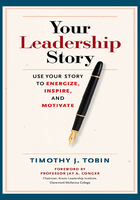
FOREWORD
Leadership starts with you. To be truly effective, you need to know who you are and who you wish to be as a leader. You have to have a clear sense of what moves you to lead. You need a strong inner compass to ensure that you are consistently making the right choices. Without this inner clarity, you'll be pulled in directions that are unlikely to harness your potential or the potential of those who follow you. Metaphorically, it's like navigating a new city without the map app on your phone. You'll experience one misstep after another. You will not arrive at the aspirational end point each of us wishes to achieve over our lifetime.
So the journey to leading begins with you—discovering and making the most of personal passions, preempting costly mistakes through core values and remembering lessons learned in your past. You have to know your own leadership story. This singular insight is why Tim Tobin's book must be at the top of your reading list. It is a paradox, but if you wish to lead, you have to take a step back. You need to reflect on what means the most to you and to those you lead.
In my own work with executives and managers, I am surprised at how many have given far too little thought to who they are or who they wish to be as leaders. It is shocking. I say this because I know the price they are paying for this lack of insight. Instead of leading, they end up spending their days managing at best. They are pulled by whatever demands their immediate attention. They will also make poor choices because they lack an inner sense of what's the right thing to do. They'll make compromises when they shouldn't. They'll repeat their mistakes. They will all too rarely articulate their aspirations since these are drowned out by a "ticking the boxes" mentality. As a result, these individuals lack vision and consequently lack the capacity to inspire. The ultimate price they pay for this lack of insight into themselves? They never realize their personal potential. Quite a number plateau in their careers, or, worse yet, they derail.
What Tim Tobin has done so beautifully is to provide a structured means for you to explore the essential dimensions of your personal leadership story. I will say that his book is the most thorough guide to crafting such stories that I have read. He takes you step-by-step. By deploying wide-ranging and provocative questions, he will have you reflecting deeply on what has shaped you as a leader and where you wish to go as a leader. I like to think of his book as the equivalent of the Mayo Clinic's Executive Physical for leadership stories—every dimension of you as a leader will be explored!
But why are these personal stories so essential to leadership? There is a funny thing that happens when you have to create a story for yourself. It forces you to powerfully clarify what is most meaningful and inspirational to you. You'll also come to realize that you really do possess an inner set of values. These are touchstones for your mental well-being. If you stray from them for long, something deep inside will disturb you over and over again. With clarity, you will be less seduced by the immediate distractions that take you away from your gifts and the accomplishments you wish to achieve. You will be less seduced by choices that have a short-term payoff (in reality, a false sense of accomplishment) but have a longer-term and expensive cost. As you go public with your story and share it widely, you'll experience a greater sense of personal accountability to live up to it. In other words, you will find yourself not only telling your story but also living it far more consistently! You will discover how it gives you so much more clarity when you are confronted with daily crossroad choices.
There's another big advantage to having a rich leadership story. It will help your associates to remember the right choices they need to make every day. They will be reminded of what is most meaningful about the work you do as a team and the values and parameters that should guide every important decision. Why is that? Pioneering work in neuroscience and memory is revealing that stories engage us far more profoundly than PowerPoint presentations or abstract discussions or value and mission statements. They are incredibly sticky. We easily retain in our memories the moving personal stories of others. Witness those told thousands of years ago by the world's great religious leaders. Their stories, rich in lessons and guidelines, remain vivid today. We can recall them with ease.
What also makes this book special is that you will be learning from one of the most passionate individuals in the field of leadership. Tim loves leadership. He has lived it, taught it, studied it, and coached it. He has spent years learning the methodology of constructing effective leadership stories. This passion comes through in the purpose of this book: to help individuals see and experience their potential to truly lead.
In sum, your investment in this book will expand your conception of who you are and can be as a leader. In the long run, it will transform your impact over your career. I wish you a wonderful journey of self-discovery.
Jay A. Conger
Chairman
Kravis Leadership Institute
Claremont McKenna College